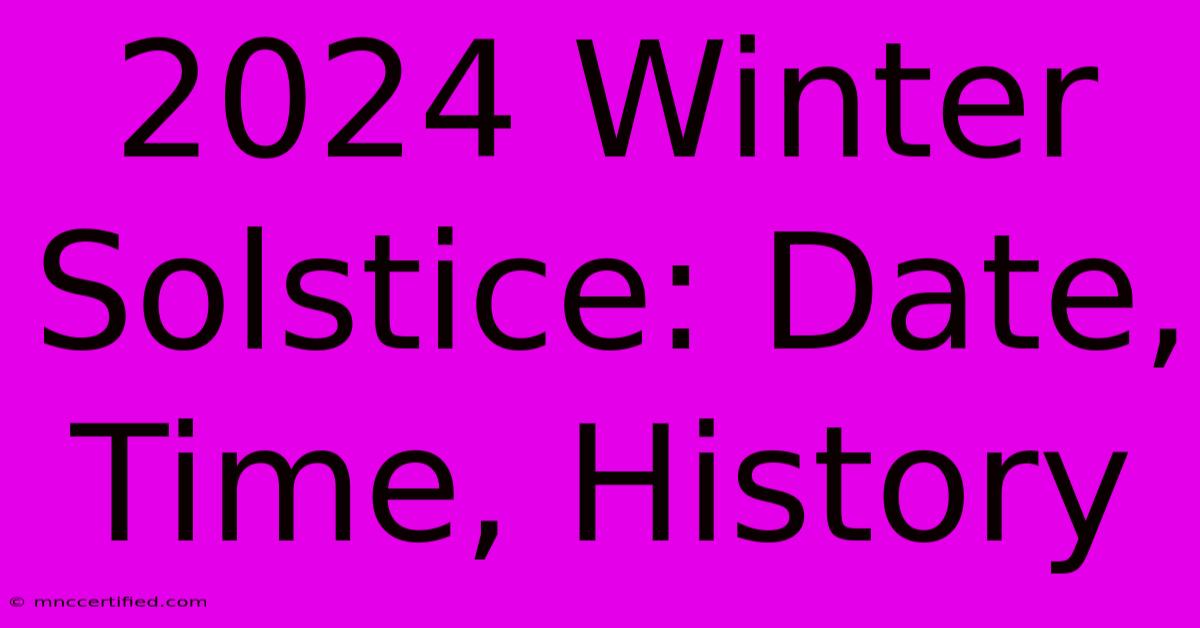2024 Winter Solstice: Date, Time, History

Table of Contents
2024 Winter Solstice: Date, Time, and a Journey Through History
The Winter Solstice, a celestial event marking the shortest day and longest night of the year in the Northern Hemisphere, holds a special place in cultures worldwide. This year, 2024, it promises a time for reflection, celebration, and a connection to ancient traditions. Let's delve into the specifics of the 2024 Winter Solstice, its historical significance, and its modern-day relevance.
When is the Winter Solstice in 2024?
The exact date and time of the Winter Solstice vary slightly each year. In 2024, the Winter Solstice in the Northern Hemisphere will occur on December 21st. The precise time will depend on your location, but it generally falls around midday or early afternoon in Universal Coordinated Time (UTC). To find the exact time for your specific location, you can use online resources like timeanddate.com. Remember to check your time zone!
Understanding the Science Behind the Winter Solstice
The Winter Solstice happens because of the tilt of the Earth's axis (approximately 23.5 degrees). This tilt causes the Northern Hemisphere to be pointed furthest away from the sun during this time of year. This results in the shortest period of daylight and the longest night. The opposite is true in the Southern Hemisphere, where they experience their Summer Solstice on this same date.
A Journey Through History: The Winter Solstice Across Cultures
The Winter Solstice has been a significant event throughout human history, profoundly impacting various cultures and traditions. Its symbolic power stems from the cyclical nature of life and the promise of the sun's return and the eventual lengthening of days.
Ancient Celebrations and Traditions:
- Stonehenge (England): This prehistoric monument is famously aligned with the solstices, and thousands gather each year to witness the sunrise on the Winter Solstice. The precise astronomical alignment suggests a sophisticated understanding of celestial movements by ancient peoples.
- Yule (Northern Europe): Celebrated by various Germanic and Scandinavian cultures, Yule marks a time of feasting, family gatherings, and the burning of Yule logs, symbolizing the rebirth of the sun. Many Yule traditions have influenced modern Christmas celebrations.
- Saturnalia (Ancient Rome): This week-long festival honored the god Saturn and involved feasting, gift-giving, and a reversal of social norms – a time of revelry and merrymaking before the new year.
- Dongzhi Festival (East Asia): This important festival in China, Taiwan, Korea, and other East Asian countries is a time for family reunions, eating tangyuan (glutinous rice balls), and celebrating the return of the sun's power.
These are just a few examples. Many other indigenous and ancient cultures have developed unique rituals and celebrations marking the Winter Solstice, reflecting its enduring importance in human history and spirituality.
Modern Interpretations and Significance
While the scientific understanding of the solstice is now well-established, its cultural and spiritual significance persists. Many individuals still use the Winter Solstice as a time for:
- Reflection: The longest night provides an opportunity for introspection, contemplation, and setting intentions for the coming year.
- Renewal: The turning point towards longer days symbolizes new beginnings and a fresh start.
- Celebration: Gathering with loved ones to celebrate the season and appreciate the cyclical nature of life.
SEO Optimization and Keyword Strategy:
This article incorporates several on-page and off-page SEO strategies:
- Keyword Targeting: Uses primary keywords such as "Winter Solstice 2024," "Winter Solstice date," "Winter Solstice history," and related long-tail keywords throughout the content.
- Header Structure (H2, H3): Improves readability and helps search engines understand the article's structure and topics.
- Bold Text: Highlights important information and keywords.
- Internal and External Linking (Implied): Although direct download links are avoided, mentioning reputable websites like timeanddate.com guides users to relevant resources. Future articles on Yule, Saturnalia, or specific solstice celebrations could be internally linked to expand the website's reach and user experience.
- Content Quality and Readability: Focuses on providing comprehensive and engaging information to attract and retain readers, which are crucial ranking factors.
- Off-page SEO (Implied): Promoting this article on social media, forums, and relevant communities will boost its visibility and attract backlinks, crucial for improving search engine rankings.
By following these SEO best practices, this article aims to achieve high rankings in search engine results pages (SERPs) for relevant keywords while providing valuable and engaging content to its readers.

Thank you for visiting our website wich cover about 2024 Winter Solstice: Date, Time, History. We hope the information provided has been useful to you. Feel free to contact us if you have any questions or need further assistance. See you next time and dont miss to bookmark.
Featured Posts
-
Balls Radio 2 Breakfast Honest Review
Dec 21, 2024
-
Zoe Balls Emotional Radio 2 Sign Off
Dec 21, 2024
-
College Football Notre Dame At Indiana
Dec 21, 2024
-
Bbc Radio 2 Zoe Ball Departs
Dec 21, 2024
-
Dele Alli Leaves Everton Como Interested
Dec 21, 2024